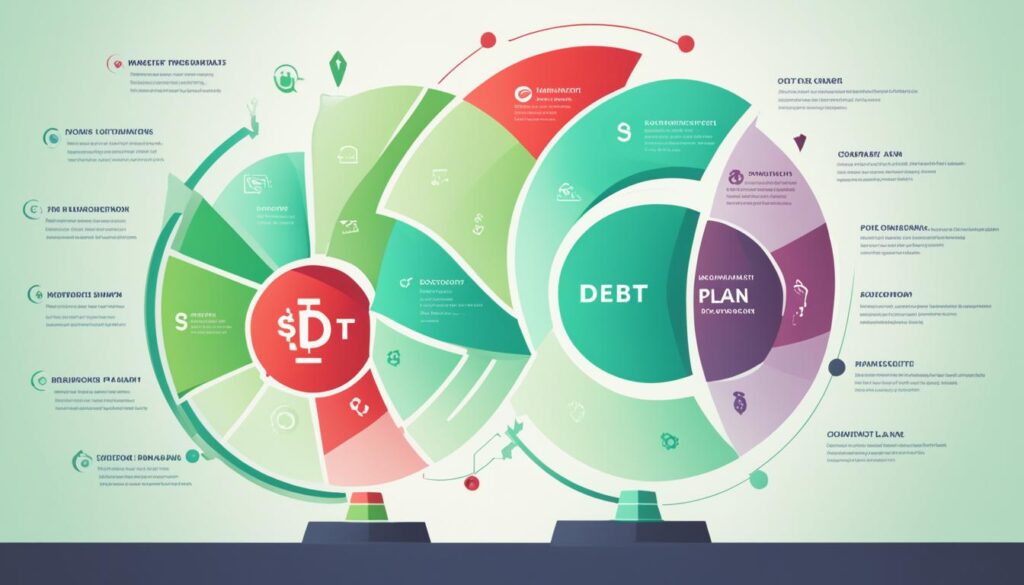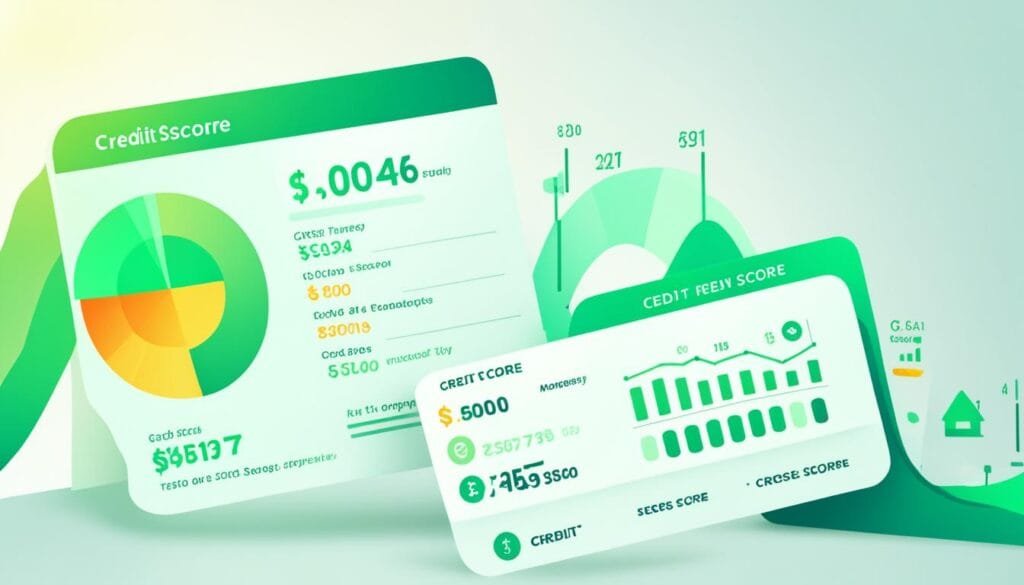Imagine this scenario: Sarah, a hardworking individual with a steady job and a family to support, finds herself drowning in debt. Credit card bills, personal loans, and medical expenses have piled up, and she feels overwhelmed and unsure how to regain control of her finances.
Desperate for a solution, Sarah decides to explore debt management plans (DMPs). She knows that a DMP can help her consolidate her debts into one affordable monthly payment and negotiate better terms with her creditors. With the guidance of a credit counseling agency, she creates a realistic plan to get out of debt and regain financial stability.
As Sarah embarks on her debt management journey, she discovers the importance of budgeting, financial planning, and debt repayment strategies. She learns how to navigate the complexities of debt consolidation and credit counseling. With each passing month, she sees progress and feels a renewed sense of hope.
Key Takeaways:
- A debt management plan (DMP) allows you to consolidate debts into one affordable monthly payment.
- Working with a credit counseling agency can help negotiate better terms with creditors and create a realistic plan to get out of debt.
- DMPs are a popular debt solution for managing unsecured debts and can save you money on interest and fees.
- Effective debt management requires budgeting, financial planning, and commitment to debt repayment strategies.
- Consider seeking professional help and exploring debt consolidation and credit counseling options to regain financial stability.
Understanding Debt Management Plans
Debt management plans (DMPs) are a valuable tool for individuals seeking to consolidate and effectively manage their debts. By partnering with a knowledgeable credit counselor, you can create a comprehensive plan to merge your unsecured debts into a single monthly payment, making it more manageable and convenient for you to repay what you owe.
The process begins by enlisting the expertise of a trusted credit counselor who will work closely with you to assess your financial situation and develop a customized DMP. Unsecured debts, such as credit card balances, personal loans, and medical bills, can be consolidated and included in the plan. However, it is essential to note that DMPs are not applicable to secured debts like mortgages or car loans.
Once you have enrolled in a DMP, you will make a single monthly payment to the credit counseling agency. Subsequently, the agency will distribute that payment proportionately among your creditors, adhering to the negotiated terms and conditions of your plan. Through the DMP, you can benefit from reduced interest rates, waived fees, and the elimination of collection calls and letters.
“A debt management plan is a powerful tool for individuals striving to regain control of their finances. By consolidating unsecured debts and working with a credit counselor, you can simplify your repayment process and work towards becoming debt-free.”
Benefits of Debt Management Plans
Debt management plans offer several advantages that make them an attractive option for individuals looking to improve their financial situation:
- Single Payment: With a DMP, you make one monthly payment, simplifying your financial obligations and reducing the chances of missed payments.
- Lower Interest Rates: Through negotiations with your creditors, a DMP can lower your interest rates, resulting in reduced overall costs.
- Professional Guidance: Working with a credit counselor provides valuable expertise and guidance, ensuring your debt management plan is tailored to your specific needs and goals.
- Cease Collection Activities: Implementing a DMP stops collection calls and letters, offering you peace of mind and reducing stress.
By diligently adhering to your debt management plan, you can regain control of your finances and work towards a debt-free future.
Complete Table: Debt Management Plan Eligibility
| Eligible Debts | Eligible |
|---|---|
| Credit card debt | Yes |
| Personal loans | Yes |
| Medical bills | Yes |
| Mortgages | No |
| Car loans | No |
Understanding the eligibility of your debts for a DMP is crucial. While credit card debt, personal loans, and medical bills usually qualify, mortgages and car loans fall outside the scope of debt management plans. Taking this into consideration will help you make informed decisions about managing your debts effectively.
Pros and Cons of Debt Management Plans
Debt management plans can offer both advantages and disadvantages for those seeking to manage their debts effectively. It is important to weigh these factors carefully before deciding if a debt management plan (DMP) is the right solution for your financial situation.
The Pros of Debt Management Plans
- Single Payment: With a DMP, you can consolidate your debts into a single monthly payment, making it easier to manage your finances and stay organized.
- Lower Interest Rates: Through negotiation with creditors, a DMP can often secure lower interest rates, helping you save money in the long run.
- Stop Collection Calls and Letters: By enrolling in a DMP, you can put an end to the constant barrage of collection calls and letters, providing you with peace of mind.
- Reduced Credit Impact: Compared to bankruptcy or debt settlement, a DMP has a less severe impact on your credit. It shows creditors that you are actively taking steps to repay your debts, which can positively influence your credit score.
The Cons of Debt Management Plans
- Limited Access to Credit: While on a DMP, you may face limitations on accessing new credit. Some lenders may view your enrollment in a DMP as a sign of financial difficulty, making it more challenging to borrow money.
- Need to Close Credit Cards: In order to participate in a DMP, you may be required to close your credit card accounts. This can impact your credit utilization ratio and potentially lower your credit score in the short term.
- Possible Non-Agreement by Creditors: While most creditors are willing to work with you on a DMP, there is a chance that some may not agree to the proposed repayment plan. This can create complications and require adjustments to your overall debt management strategy.
It’s essential to consider both the pros and cons of debt management plans before making a decision. While the benefits of a single payment, lower interest rates, and reduced credit impact can be significant, it’s important to keep in mind the limitations on accessing credit and the need to close credit cards. By carefully weighing these factors, you can determine if a DMP aligns with your financial goals and needs.
Who Should Consider a Debt Management Plan
Debt management plans (DMPs) are a suitable option for individuals who find themselves deeply in debt but can still manage the required monthly payment. If you are struggling with multiple debts and need a more manageable approach to repayments, a DMP might be the right solution for you. However, it is essential to assess your debt load carefully before committing to a DMP.
If you are unsure whether a debt management plan is suitable for you, consider exploring alternative options such as bankruptcy or debt consolidation loans. These alternatives may provide a better fit depending on your specific financial situation and goals. To make an informed decision, it is highly recommended to consult with a qualified credit counselor who can evaluate your circumstances and provide expert advice.
Assessing Your Debt Load
Before deciding on a debt management plan, it is crucial to thoroughly assess your debt load. Calculate your total outstanding debts and determine the monthly payment amount you can comfortably afford while still meeting your other financial obligations. Keep in mind that a DMP may require you to make a single monthly payment to a credit counseling agency, who will then distribute the funds to your creditors.
Exploring Alternatives
In addition to debt management plans, there are alternative solutions available. Bankruptcy, for example, may be an appropriate choice for individuals with overwhelming debt and limited ability to make monthly payments. Debt consolidation loans, on the other hand, can provide a way to combine multiple debts into a single loan with a fixed interest rate. Each option has its pros and cons, so it’s important to weigh them against your specific circumstances.
Consulting with a Credit Counselor
When considering a debt management plan and evaluating alternative options, seeking guidance from a qualified credit counselor is crucial. A credit counselor can assess your overall financial situation, review your debts, and help you determine the most suitable course of action. They have the expertise to guide you through the process, explain the potential impact on your credit, and ensure you are making an informed decision.

Types of Debt Management Plans
In the world of debt management, there are two main types of plans: for-profit DMPs and nonprofit DMPs. Understanding the differences between these two options is essential when considering a debt management plan.
For-Profit DMP
A for-profit DMP is offered by agencies that prioritize profitability. These agencies typically charge fees for their services, which can sometimes be high. While for-profit DMPs may have their own advantages, it’s important to carefully evaluate the fees involved and ensure that the benefits outweigh the costs.
Nonprofit DMP
On the other hand, nonprofit DMPs are typically provided by reputable credit counseling agencies. These agencies prioritize the well-being of their clients and often offer their services for free or at a low cost. Choosing a reputable credit counseling agency for a nonprofit DMP can provide peace of mind and the assurance of receiving quality assistance without excessive fees.
When considering a debt management plan, it is crucial to research and select a reputable credit counseling agency. This will help ensure that you receive trustworthy advice and assistance that aligns with your financial goals.

| Types of Debt Management Plans | Key Points |
|---|---|
| For-Profit DMP |
|
| Nonprofit DMP |
|
Best Debt Management Companies
Choosing the right debt management company can make a significant difference in your journey towards financial stability. When exploring your options, it’s essential to consider key factors such as the monthly fee, setup fee, completion time, and the types of debt that can be included in the plan.
Two reputable debt management companies that stand out in the industry are American Consumer Credit Counseling, Inc. (ACCC) and Cambridge Credit Counseling. These companies offer comprehensive debt management programs designed to reduce your monthly payments and interest rates while providing ongoing support and education throughout the process.
ACCC: This highly regarded debt management company offers personalized solutions tailored to your specific financial situation. Their expert credit counselors will work closely with you to create a customized debt management plan that aligns with your goals. With ACCC, you can expect a transparent fee structure, competitive monthly fees, and a commitment to helping you achieve lasting financial success.
Cambridge Credit Counseling: Known for its dedication to consumer empowerment, Cambridge Credit Counseling offers a wide range of debt management services. Their knowledgeable counselors strive to provide effective debt solutions that fit your needs. Through their programs, you can benefit from reduced interest rates, simplified payment plans, and improved financial literacy.
By partnering with a reputable debt management company like ACCC or Cambridge Credit Counseling, you can take control of your finances and pave the way towards a debt-free future.
Comparing Debt Management Companies
To assist you in making an informed decision, the table below compares the key features of ACCC and Cambridge Credit Counseling:
| Company | Monthly Fee | Setup Fee | Completion Time | Debt Types |
|---|---|---|---|---|
| ACCC | Affordable, competitive fees | No setup fee | Typically 3-5 years | Credit cards, personal loans, medical bills, and more |
| Cambridge Credit Counseling | Varies based on program | No setup fee | Typically 3-5 years | Credit cards, personal loans, medical bills, and more |
How Can Debt-to-Income Ratio Impact the Success of Debt Management Plans?
Understanding debttoincome ratio essentials for borrowers is crucial when crafting a debt management plan. This ratio measures your financial health, influencing lenders’ trust in your repayment ability. A high ratio signals risk, which may hinder negotiating lower interest rates or favorable payment terms, potentially derailing your debt management strategy.
Conclusion
Effective debt management is essential for achieving financial stability and successfully managing debt. By creating a budget, prioritizing expenses, seeking professional financial assistance when necessary, and investing in reputable projects, individuals and businesses can navigate their debt and achieve their financial goals.
Regularly reviewing and updating your financial plan is important, as is considering strategies such as debt consolidation and refinancing to optimize your debt management efforts. Remember that effective debt management requires time, patience, and vigilance, but it is possible to achieve financial freedom with the right strategies and tools.
By implementing a comprehensive debt management program, you can take control of your finances, reduce debt burdens, and pave the way towards a more secure financial future. Prioritize your financial well-being and make proactive decisions to manage your debt effectively, ensuring a stable and prosperous financial life.
FAQ
What is a debt management plan (DMP)?
A debt management plan (DMP) is a payment schedule that allows you to consolidate debts into one affordable monthly payment and pay down your debt over time. It involves working with a credit counseling agency to negotiate better terms with your creditors and create a realistic plan to get out of debt.
What types of debts can be included in a debt management plan?
Debt management plans are typically used for unsecured debts such as credit cards, personal loans, and medical bills. They are not available for secured debts such as mortgages or car loans.
What are the advantages and disadvantages of a debt management plan?
The advantages include having a single payment that is likely lower than your current combined debts, saving money on interest and fees through negotiation with creditors, and stopping collection calls and letters. However, there are also disadvantages such as potential limitations on accessing credit, the need to close credit cards, and the possibility of some creditors not agreeing to the plan. It is important to weigh these factors before deciding if a DMP is right for you.
Who should consider a debt management plan?
Debt management plans are best suited for individuals who are deeply in debt but still able to make the required monthly payment. It is important to assess your debt load and determine if a DMP is the right solution for you. Additionally, there are alternative options such as bankruptcy or debt consolidation loans that may be more suitable depending on your situation. Consulting with a qualified credit counselor can help you determine if a DMP is the best course of action.
What are the different types of debt management plans?
Debt management plans can be categorized into two main types: for-profit and nonprofit. For-profit DMPs are offered by agencies that focus on profitability and may charge high fees for their services. Nonprofit DMPs, on the other hand, are typically offered by reputable credit counseling agencies and may provide their services for free or at a low cost. It is important to research and choose a reputable credit counseling agency when considering a DMP.
What are some of the best debt management companies?
Some of the best debt management companies include American Consumer Credit Counseling, Inc. (ACCC) and Cambridge Credit Counseling. These companies offer debt management programs that aim to reduce monthly payments and interest rates while providing ongoing support and education throughout the process.
How can I effectively manage my debt?
Effective debt management is crucial for achieving financial stability and managing debt successfully. By setting a budget, aligning spending with priorities, seeking professional financial help when needed, and investing in trustworthy projects, individuals and businesses can navigate their debt and achieve their financial goals. It is important to regularly review and update your financial plan, and consider strategies such as debt consolidation and refinancing to optimize your debt management efforts. Remember that effective debt management takes time, patience, and vigilance, but it is possible to achieve financial freedom with the right strategies and tools.

